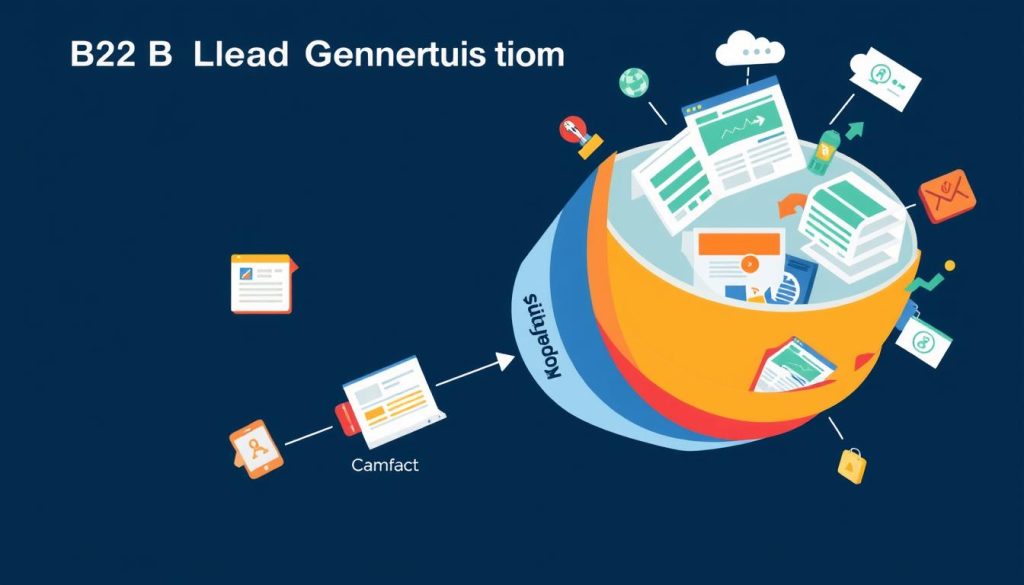In the dynamic world of B2B marketing, capturing leads effectively is crucial for business growth and success. As the digital landscape continues to evolve, savvy B2B marketers are leveraging a range of online strategies to connect with their target audience and generate high-quality leads. This comprehensive guide will explore proven tactics to help your B2B business thrive in the competitive digital arena.
By understanding the B2B lead generation landscape, developing a targeted strategy, and implementing a diverse mix of digital marketing tactics, you can unlock new opportunities to grow your business and drive success. From leveraging content marketing and social media to optimizing your website and utilizing email campaigns, this article will equip you with the knowledge and tools necessary to capture B2B leads online and convert them into valuable customers.
Key Takeaways
- Understand the importance of lead generation in the B2B marketing landscape
- Develop a targeted B2B lead generation strategy to reach your ideal customers
- Leverage content marketing, social media, and other digital tactics to capture leads online
- Optimize your website and implement effective lead capture forms to convert visitors
- Utilize email marketing and paid advertising to nurture and convert B2B leads
Understanding the B2B Lead Generation Landscape
Successful B2B marketing hinges on the ability to effectively generate and nurture leads. Lead generation plays a vital role in driving business growth, as it helps B2B companies identify and engage with potential customers throughout their buyer’s journey. Understanding the importance of lead generation and the unique challenges faced by B2B marketers is essential for crafting a winning strategy.
The Importance of Lead Generation in B2B Marketing
In the B2B landscape, lead generation is the lifeblood of a successful marketing and sales pipeline. By capturing and nurturing high-quality leads, B2B companies can build a steady stream of qualified prospects, ultimately driving increased revenue and business growth. Effective lead generation strategies allow B2B marketers to better understand their target audience, deliver relevant content, and ultimately convert more leads into loyal customers.
Challenges Faced by B2B Marketers in Lead Generation
While the significance of lead generation is clear, B2B marketers often face unique challenges in this area. Some of the key challenges include:
- Identifying and Engaging the Right Audience: B2B buyers often have complex decision-making processes, making it crucial for marketers to understand their target audience and their specific pain points and needs.
- Capturing Leads in the Digital Landscape: With the shift towards online and digital channels, B2B marketers must adapt their lead capture strategies to effectively reach and engage their audience in the digital realm.
- Nurturing Leads through the Lengthy B2B Buyer’s Journey: B2B sales cycles are typically longer and more complex than their B2C counterparts, requiring a strategic approach to lead nurturing and relationship building.
- Measuring and Optimizing Lead Generation Efforts: Accurately tracking and analyzing the performance of lead generation campaigns is crucial for B2B marketers to identify and scale effective strategies.
By understanding these challenges and developing targeted strategies to address them, B2B marketers can enhance their lead generation efforts and drive sustainable business growth.
| Key B2B Lead Generation Challenges | Strategies to Overcome Them |
|---|---|
| Identifying and Engaging the Right Audience | Conduct thorough market research, create buyer personas, and tailor content to address specific pain points. |
| Capturing Leads in the Digital Landscape | Optimize website for lead capture, leverage digital channels like social media and content marketing. |
| Nurturing Leads through the Lengthy B2B Buyer’s Journey | Implement a strategic lead nurturing program, personalize communication, and provide valuable content at every stage. |
| Measuring and Optimizing Lead Generation Efforts | Establish clear KPIs, track performance, and continuously refine strategies based on data-driven insights. |
Developing an Effective B2B Lead Generation Strategy
Crafting a successful B2B lead generation strategy requires a deep understanding of your target audience and aligning your content marketing efforts with their buyer’s journey. By taking the time to define your B2B target audience and develop buyer personas, you can create a strategic roadmap to effectively capture and nurture high-quality leads.
Defining Your Target Audience
The foundation of any effective B2B lead generation strategy is a thorough understanding of your target audience. Conduct extensive B2B target audience research to uncover crucial insights about your ideal customers, such as their pain points, challenges, buying behavior, and preferred communication channels. Develop detailed buyer personas that represent your target segments, allowing you to tailor your content and outreach strategies to their unique needs.
Aligning Your Content with the Buyer’s Journey
Once you have a clear picture of your target audience, the next step is to align your content marketing strategy with the various stages of the buyer’s journey. Craft a diverse range of content assets, from educational blog posts and industry-specific whitepapers to webinars and product demonstrations, to engage prospects at each phase of their decision-making process. By providing valuable, relevant content that addresses their evolving needs, you can nurture leads and guide them towards conversion.

Developing an effective B2B lead generation strategy is a continuous process of research, content creation, and optimization. By meticulously defining your target audience and aligning your content marketing efforts with the buyer’s journey, you can effectively capture, nurture, and convert high-quality leads that drive your business growth.
Capturing B2B Leads Online with Targeted Strategies
In the dynamic world of B2B digital marketing, capturing and converting leads online is a critical component of success. By leveraging a diverse array of targeted strategies and cutting-edge lead generation tools, businesses can effectively reach and engage their ideal customers in the virtual landscape.
One key aspect of online lead capture is the optimization of your company’s website. Through strategic website design, intuitive user experience, and the strategic placement of lead capture forms, you can seamlessly guide your visitors towards conversion actions. Coupled with the creation and distribution of valuable, relevant content, your website can become a powerful lead generation engine.
Additionally, B2B marketers can explore a variety of B2B digital marketing tactics to capture leads, such as leveraging social media platforms, implementing targeted paid advertising campaigns, and leveraging the power of email marketing. By integrating these tactics with a well-planned content distribution strategy, businesses can effectively reach and engage their target audience, ultimately driving lead generation and conversion.
To maximize the effectiveness of your online lead capture efforts, it’s essential to continuously monitor and analyze your results. By tracking key performance indicators, you can refine your strategies, identify areas for improvement, and optimize your lead generation campaigns for optimal success.
By embracing a comprehensive and strategic approach to online lead capture, B2B organizations can position themselves for sustained growth and success in the ever-evolving digital landscape.
Leveraging Content Marketing for Lead Generation
In the world of B2B marketing, content is king. By creating valuable, relevant, and engaging content, businesses can effectively capture the attention of their target audience and convert them into leads. Content marketing for B2B lead gen is a powerful strategy that goes beyond simply promoting your products or services.
Creating Valuable and Relevant Content
The key to successful content strategy development lies in understanding your target audience’s pain points, challenges, and informational needs. Crafting thought leadership content that addresses these concerns and provides genuine value will help you establish trust and position your brand as a trusted industry authority.
From in-depth blog posts and whitepapers to eye-catching infographics and webinars, the range of lead magnet creation opportunities is vast. By consistently producing high-quality content and distributing it through strategic content distribution channels, you can effectively capture the attention of your potential customers and nurture them through the buyer’s journey.
“Content marketing is a strategic marketing approach focused on creating and distributing valuable, relevant, and consistent content to attract and retain a clearly defined audience — and, ultimately, to drive profitable customer action.”
Remember, the goal of content marketing for B2B lead gen is not just to inform, but to inspire and captivate your audience. By tailoring your content to their specific needs and preferences, you can create a powerful lead generation machine that drives measurable results for your business.
Utilizing Social Media for B2B Lead Generation
In the dynamic world of B2B marketing, harnessing the power of social media has become a critical strategy for lead generation. By leveraging platforms like LinkedIn, Twitter, and Facebook, B2B businesses can effectively build brand awareness, engage with their target audience, and capture qualified leads.
One of the most successful social media channels for B2B lead generation is LinkedIn. With its professional focus, LinkedIn lead generation allows businesses to connect with decision-makers, industry experts, and potential customers. By creating a strong company presence, sharing valuable social media content strategy, and engaging in social selling, B2B marketers can position themselves as thought leaders and nurture relationships that ultimately drive leads.
Additionally, platforms like Twitter and Facebook offer opportunities for social media marketing for B2B companies to amplify their content, participate in industry discussions, and target specific audiences through B2B social media advertising campaigns. By aligning their social media strategy with the buyer’s journey, B2B marketers can create a consistent and compelling brand presence that attracts and converts qualified leads.
| Social Media Platform | Key Benefits for B2B Lead Generation |
|---|---|
| Professional networking, thought leadership, social selling | |
| Real-time engagement, content amplification, industry discussions | |
| Targeted advertising, brand awareness, content distribution |
By strategically leveraging the unique capabilities of various social media platforms, B2B businesses can unlock a wealth of opportunities for lead generation, building a pipeline of qualified prospects and ultimately driving business growth.
Optimizing Your Website for Lead Capture
In the world of B2B marketing, your website serves as the digital storefront, a crucial touchpoint for capturing and nurturing valuable leads. By optimizing your website’s design and user experience, you can significantly enhance your lead generation efforts and drive more conversions.
Website Design and User Experience
An intuitive and visually appealing website design can greatly influence the user’s journey and their likelihood of converting into a lead. Focus on creating a clean, responsive layout that is easy to navigate. Ensure your website UX design prioritizes the user’s needs, guiding them seamlessly through the content and call-to-action (CTA) elements.
Incorporate engaging visual elements, such as high-quality images and videos, to showcase your products or services. Optimize the page load times and ensure a smooth browsing experience across all devices to improve conversion rate optimization.
Implementing Lead Capture Forms
Strategic placement of lead capture forms is essential for converting website visitors into valuable leads. Strategically position lead capture forms throughout your website, such as on landing pages, in the sidebar, or as a pop-up, to encourage users to share their contact information.
Design your forms with a clean, user-friendly layout, and minimize the number of required fields to improve the overall experience. Offer incentives, such as gated content or exclusive resources, to entice users to provide their information and become leads.

By focusing on B2B website optimization and the strategic implementation of lead capture forms, you can unlock the full potential of your website as a powerful lead generation tool, driving more qualified leads and ultimately, revenue growth for your business.
Email Marketing for B2B Lead Generation
In the realm of B2B lead generation, email marketing has emerged as a powerful tool. By building an email list of targeted prospects, businesses can craft personalized lead nurturing campaigns that effectively capture, qualify, and convert leads. This section explores the strategies for leveraging email marketing to drive B2B success.
Building an Email List
The foundation of effective email marketing for B2B lead generation lies in building a robust and targeted email list. This can be achieved through various tactics, such as:
- Offering valuable gated content, such as whitepapers, case studies, or webinars, in exchange for email addresses
- Optimizing website forms and calls-to-action to encourage visitor email signup
- Leveraging email capture pop-ups or slide-ins on your website
- Promoting email list signup on your social media channels and in email signatures
- Participating in industry events or directories to collect email contacts
By implementing these strategies, you can gradually build a database of qualified B2B leads interested in your products or services.
Utilizing Marketing Automation
To streamline the lead generation process, many B2B companies are leveraging marketing automation platforms. These tools enable businesses to create automated email campaigns that nurture leads through the buyer’s journey, from initial engagement to conversion. Key features of marketing automation include:
- Segmentation and personalization: Divide your email list into targeted segments based on demographics, firmographics, or behaviors, and craft personalized messaging for each group.
- Automated lead scoring: Assign points to lead actions, such as website visits, content downloads, or email opens, to identify the most engaged prospects and prioritize them for sales outreach.
- Triggered email sequences: Set up automated email workflows that respond to specific user actions, ensuring timely and relevant communication with leads.
By integrating email marketing with marketing automation, B2B companies can scale their lead generation efforts and improve conversion rates.
| Email Marketing Metric | Benchmark | Top Performers |
|---|---|---|
| Open Rate | 17-22% | 25-35% |
| Click-Through Rate | 2-5% | 5-10% |
| Conversion Rate | 1-2% | 3-5% |
By implementing strategic email marketing tactics and leveraging the power of marketing automation, B2B companies can effectively capture and nurture leads, driving increased conversion rates and revenue growth.
Paid Advertising for B2B Lead Generation
In the realm of B2B lead generation, paid advertising has emerged as a powerful tool for capturing qualified prospects. By leveraging digital advertising strategies, B2B marketers can target their ideal customers with laser-like precision, driving high-quality leads and accelerating their sales funnel.
One of the key advantages of B2B paid advertising is the ability to reach a specific audience through platforms like Google Ads and LinkedIn Ads. These channels allow businesses to create targeted ad campaigns that resonate with their ideal buyers, whether they’re searching for relevant products and services or actively engaged on professional social networks.
When it comes to PPC for lead generation, B2B marketers can optimize their campaigns to generate a steady stream of qualified leads. By crafting compelling ad copy, leveraging audience targeting, and continually refining their digital advertising strategies, they can capture the attention of their target audience and encourage them to take the desired action, such as filling out a lead capture form or scheduling a consultation.
Moreover, LinkedIn ads have become a go-to platform for many B2B companies, as they enable marketers to reach decision-makers and influencers within their industry. By creating targeted ad campaigns that speak directly to their pain points and challenges, businesses can position themselves as trusted solutions and generate high-quality leads that are more likely to convert.
| Advertising Platform | Key Benefits for B2B Lead Generation |
|---|---|
| Google Ads | Reach prospects actively searching for relevant products or services, optimize campaigns for lead generation |
| LinkedIn Ads | Target professional audiences and decision-makers, leverage advanced targeting options to reach the right prospects |
By embracing the power of B2B paid advertising, businesses can unlock a new level of lead generation success, delivering high-quality prospects and driving tangible growth for their organization.

Measuring and Analyzing Lead Generation Efforts
In the dynamic world of B2B marketing, tracking and analyzing your lead generation efforts is crucial for data-driven decision making. By monitoring key performance indicators (KPIs) for lead generation, you can gain valuable insights to optimize your campaigns and drive meaningful growth.
Key Performance Indicators (KPIs) for Lead Generation
To gauge the success of your B2B lead gen efforts, consider tracking the following KPIs:
- Lead Volume: The total number of leads generated within a specific time frame, providing an overview of the pipeline.
- Lead Quality: Metrics like lead-to-opportunity and lead-to-customer conversion rates, indicating the quality of your leads.
- Cost per Lead: The average cost associated with acquiring each new lead, helping you understand the efficiency of your marketing spend.
- Marketing Qualified Leads (MQLs): Leads that have been deemed ready for sales engagement based on predetermined criteria.
- Sales Qualified Leads (SQLs): Leads that have been vetted by the sales team and are deemed ready for the next stage of the sales process.
By regularly monitoring these B2B lead gen metrics, you can uncover valuable insights to guide your data-driven decision making and optimize your marketing analytics and campaign optimization efforts.
“Measuring and analyzing your lead generation efforts is the key to unlocking sustainable growth in the B2B landscape.”
Nurturing and Converting B2B Leads
Capturing B2B leads is just the beginning of the sales journey. To drive meaningful conversions, businesses must focus on nurturing those leads and guiding them through the sales funnel. Lead nurturing strategies, lead qualification, and lead scoring models play a critical role in aligning your sales and marketing efforts, ensuring that the right leads receive the right attention at the right time.
Lead Scoring and Prioritization
Effective lead scoring models help you identify the most promising leads based on their level of engagement, firmographic data, and buying intent. By assigning numeric values to various lead attributes, you can prioritize your outreach efforts and allocate your resources more efficiently. This helps your sales team focus on the leads with the highest potential for conversion, optimizing your conversion optimization efforts.
Maintaining sales-marketing alignment is crucial for successful lead nurturing. By sharing insights and collaborating on lead scoring and prioritization, your sales and marketing teams can work together to create personalized, targeted campaigns that guide leads through the buyer’s journey.
| Lead Nurturing Strategies | Key Benefits |
|---|---|
| Email Drip Campaigns | Keeps leads engaged and informed |
| Content Personalization | Delivers relevant, value-added information |
| Remarketing Ads | Stays top-of-mind and encourages re-engagement |
| Automated Nurture Workflows | Streamlines the lead nurturing process |
By implementing a strategic approach to lead nurturing, businesses can effectively convert their B2B leads into loyal customers, driving long-term growth and success.

Integrating Lead Generation with CRM
Leveraging a customer relationship management (CRM) system is a game-changer for B2B sales and marketing teams. By integrating your lead generation efforts with a robust CRM platform, you can unlock a wealth of benefits that drive better lead conversion and overall business growth.
One of the key advantages of CRM integration is improved lead visibility. Instead of having scattered lead data across various sources, a well-integrated CRM system consolidates all your lead information in a centralized location. This gives your sales team a comprehensive overview of each lead, enabling them to make data-driven decisions and provide a more personalized customer experience.
Another critical benefit is automated lead nurturing. By connecting your lead generation strategies with CRM, you can set up intelligent lead nurturing workflows that keep your prospects engaged throughout the buyer’s journey. This ensures that qualified leads are nurtured with relevant content and outreach, ultimately increasing the chances of conversion.
Perhaps most importantly, CRM integration fosters better alignment between your sales and marketing teams. With a shared view of lead data and activities, both departments can work in tandem to optimize lead generation, qualification, and conversion. This collaborative approach, powered by data-driven insights from the CRM, leads to more efficient and effective B2B sales and marketing efforts.
By embracing the power of CRM integration, B2B organizations can unlock the full potential of their lead generation strategies, driving more leads, improving lead visibility, and accelerating their sales and marketing alignment for sustainable growth.
| Benefits of CRM Integration for Lead Generation | Description |
|---|---|
| Improved Lead Visibility | Consolidates lead data in a centralized CRM system, providing a comprehensive view of each prospect. |
| Automated Lead Nurturing | Enables the creation of intelligent lead nurturing workflows to keep prospects engaged throughout the buyer’s journey. |
| Enhanced Sales-Marketing Alignment | Aligns sales and marketing teams around a shared view of lead data and activities, fostering collaboration and data-driven decision-making. |
Conclusion
As we conclude this exploration of B2B lead generation best practices, it’s clear that a comprehensive, targeted approach is essential for capturing qualified leads and driving sustainable growth in the digital landscape. By leveraging a diverse array of digital marketing strategies and online lead capture techniques, B2B marketers can effectively connect with their target audience, nurture valuable relationships, and position their businesses for long-term success.
Throughout this guide, we’ve examined the importance of understanding the B2B lead generation landscape, developing an effective strategy, and harnessing the power of content marketing, social media, website optimization, email marketing, and paid advertising. By implementing these B2B marketing success strategies, you can elevate your brand’s visibility, position yourself as an industry authority, and ultimately, generate a steady flow of high-quality leads that translate into meaningful business opportunities.
Remember, the key to unlocking B2B lead generation best practices lies in a data-driven, customer-centric approach that is constantly refined and optimized. By continuously measuring and analyzing your efforts, you can identify what works best, make informed decisions, and continuously improve your digital marketing strategies to drive business growth for your B2B organization. Embrace the insights and strategies outlined in this guide, and embark on a journey of lead generation excellence that will propel your business to new heights.




